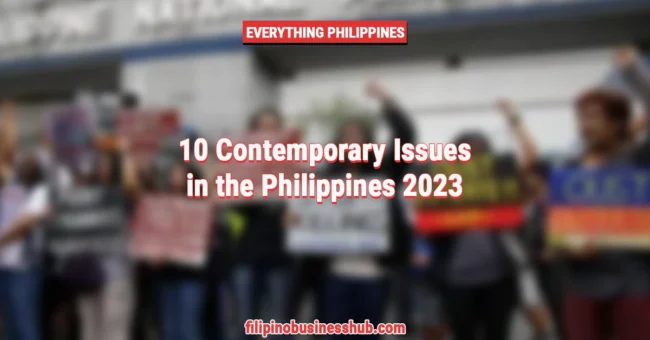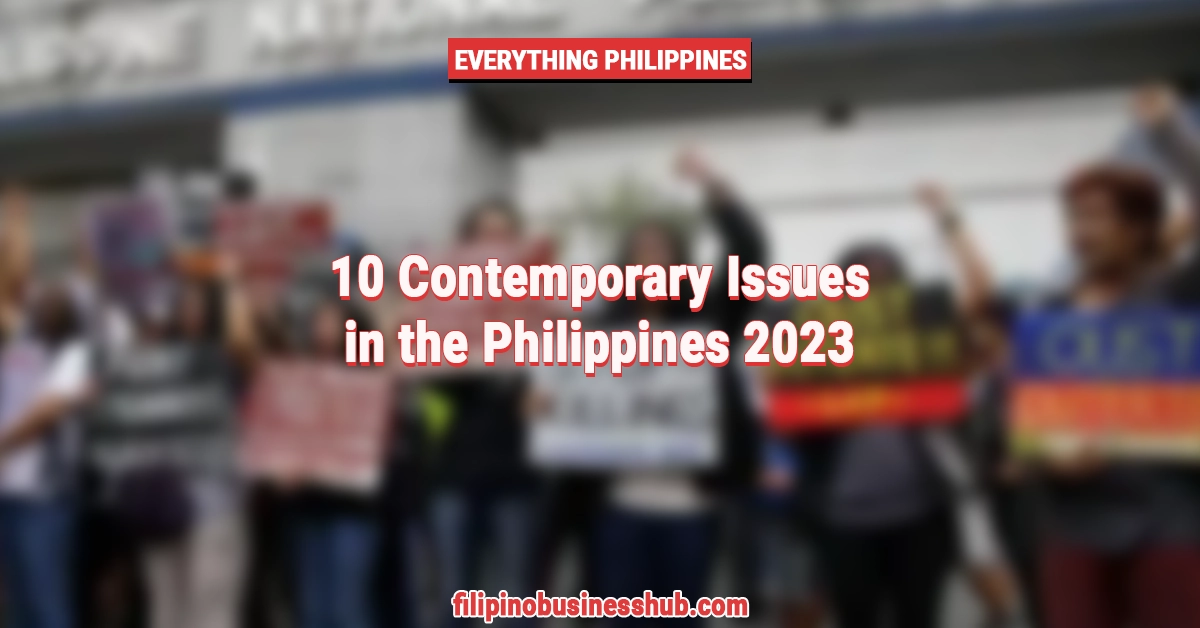10 Contemporary Issues in the Philippines 2023
The Philippines is a Southeast Asian country that has undergone significant change over recent years, from economic development and political stability to numerous contemporary issues that need attention and action from the government. Unfortunately, however, many of these issues remain multi-faceted and multi-sectoral approaches must be employed to address them adequately.
In this article, we will examine contemporary issues in the Philippines. These issues include poverty and income inequality, corruption, human rights violations, climate change impacts on education and political dynasties, cybersecurity infrastructure development, foreign relations impact, and the COVID-19 pandemic. We will also investigate their repercussions for the nation’s social, economic, and political development.
By understanding the nature and scope of these contemporary issues, we can better appreciate the challenges facing the Philippines while identifying possible solutions. We must engage in constructive yet critical dialogue about these matters while working collaboratively towards inclusive, responsive, and sustainable responses to address them.
Table of Contents

The Top 10 Contemporary Issues in the Philippines
1. COVID-19 Pandemic
The COVID-19 pandemic has left an indelible mark on the Philippines. Residents have faced increased cases and deaths as well as economic consequences of lockdowns and restrictions imposed. Furthermore, it has exposed weaknesses within their healthcare system, underlining the importance of better social protection measures for vulnerable groups.
2. Poverty and Income Inequality
Poverty and income inequality remain persistent issues in the Philippines despite recent economic growth, where development benefits were not evenly disbursed between rural areas and marginalized communities, leaving behind many rural and marginalized areas that otherwise would benefit. This has created an increasing divide between rich and poor with significant ramifications on accessing education, healthcare, and other essential services such as water.
3. Corruption
Corruption remains a formidable challenge in the Philippines. It pervades government institutions, public services, and business transactions alike – with little transparency and accountability within government, making combatting it an uphill battle.
4. Human Rights
The Philippines has been widely criticized for its record on human rights. Numerous allegations have been leveled at extrajudicial killings, police brutality, and press freedom infringement, issues which have worsened under its current administration, which has been accused of suppressing dissent and curtailing civil liberties.
5. Climate Change and Natural Disasters
The Philippines is highly susceptible to the impacts of climate change. As such, natural disasters such as typhoons, floods, droughts, and earthquakes strike with alarming regularity threatening food security, infrastructure security, and safety, as well as biodiversity loss due to deforestation or climate-induced depletion. Climate change also leads to the loss of biodiversity through deforestation and other environmental challenges, which contribute to food insecurity, infrastructure failure, and safety risks in its wake.
6. Education System
The Philippine education system faces numerous difficulties, including underfunding, low-quality instruction, inaccessible education for poor children, and an outdated curriculum. These issues have had detrimental effects on human capital development and economic advancement.
7. Political Dynasties
Dynasties are an ever-present fixture of Philippine politics, often in the form of family members holding elected positions that could hamper genuine democracy and inclusive governance. Political dynasties also often perpetuate corruption and nepotism and inhibit political competition.
8. Cybersecurity and Online Privacy
The proliferation of digital technologies in the Philippines has raised new cybersecurity and online privacy issues. As a result, crime against individuals online and privacy violations have increased, necessitating stronger regulations and law enforcement measures to safeguard citizens against potential risks.
9. Infrastructure Development
To promote economic growth and development, the Philippines requires upgrading its infrastructure – transportation systems, power grids, and water supplies. The lack of adequate infrastructure has contributed to high costs of doing business that impede its competitiveness and hinder development efforts.
10. Foreign Relations
The Philippines maintains intricate ties with neighboring nations, including China and the US. These ties can have lasting implications for its foreign policy, national security, and territorial disputes, thus necessitating it to balance these relationships while upholding sovereignty and safeguarding interests carefully.
Conclusion
The contemporary issues in the Philippines are numerous and multifaceted, demanding immediate attention and action from all relevant parties – government, civil society, and the private sector alike. Addressing them requires collaboration from all involved, working towards creating an equitable and prosperous society for its residents. Support from other nations like Singapore can assist the Philippines in meeting these challenges successfully; working together allows a brighter future for Filipino citizens while contributing to regional development.
These contemporary issues are deeply interconnected with the social problems in the Philippines discussed in this article. Read the Top 7 Social Problems in the Philippines here






